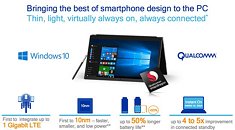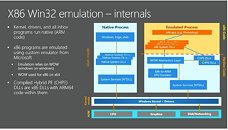
Patent War Brewing Between Intel and Qualcomm-Microsoft over x86 Emulation
Intel rigorously defends its hold over its core intellectual property, the x86 CPU machine-architecture. AMD is the only active licencee of x86, and has a competitive line of processors across market segments. It has been a long-cherished dream of chipmakers without an x86 license to have Microsoft, the world's leading PC operating system manufacturer, somehow emulate their Win32 API, which is inherently designed for the x86 architecture, on the more widely licensed ARM architecture. As one of the largest ARM chipmakers, Qualcomm pushed for 2-in-1 (notebook-to-tablet) convertible PCs driven by its Snapdragon processors, which run Windows 10, complete with support for Win32 software, besides Microsoft's UWP apps.
This Snapdragon + Windows 10 reference convertible is so impressive with its battery life and performance, that major PC OEMs such as Lenovo, HP, and ASUS have lined up to license the design and make their own designs. This would have been a licensable form-factor governed by Microsoft, much like how Intel governed the Ultrabook form-factor. This would hit hard at Intel's bottomline, because SoC makers with big R&D budgets like Qualcomm, Samsung, and NVIDIA, who each hold ARM licenses, could go on to power bigger and faster PCs which emulate x86, driving Intel out of the ecosystem. The company dropped the hammer earlier this week, in a passive-aggressive note without taking names, warning Microsoft and Qualcomm to cease from their efforts to build such a device.
This Snapdragon + Windows 10 reference convertible is so impressive with its battery life and performance, that major PC OEMs such as Lenovo, HP, and ASUS have lined up to license the design and make their own designs. This would have been a licensable form-factor governed by Microsoft, much like how Intel governed the Ultrabook form-factor. This would hit hard at Intel's bottomline, because SoC makers with big R&D budgets like Qualcomm, Samsung, and NVIDIA, who each hold ARM licenses, could go on to power bigger and faster PCs which emulate x86, driving Intel out of the ecosystem. The company dropped the hammer earlier this week, in a passive-aggressive note without taking names, warning Microsoft and Qualcomm to cease from their efforts to build such a device.


